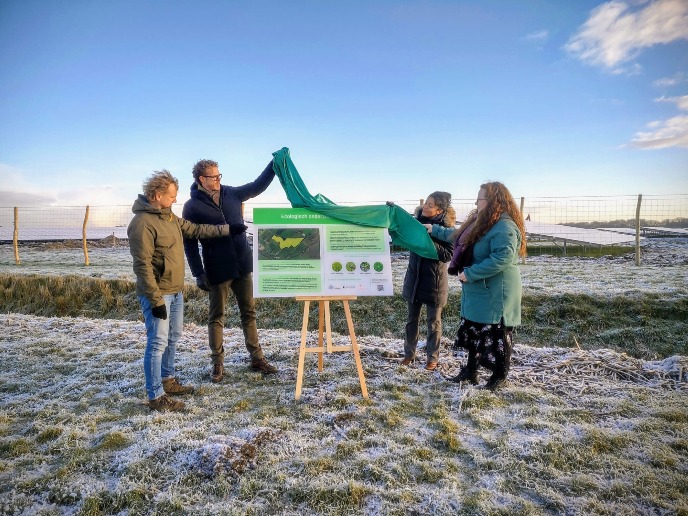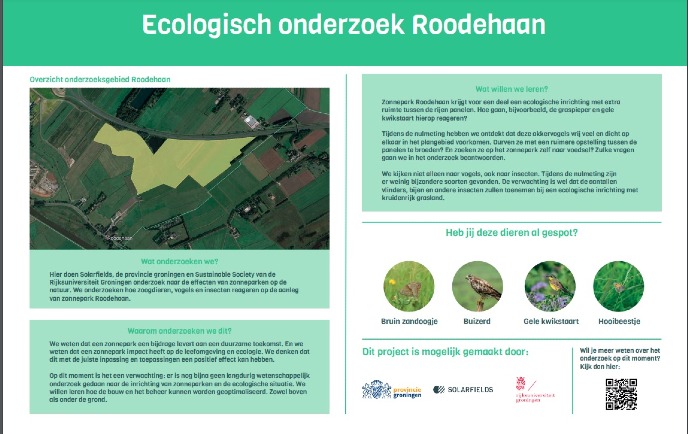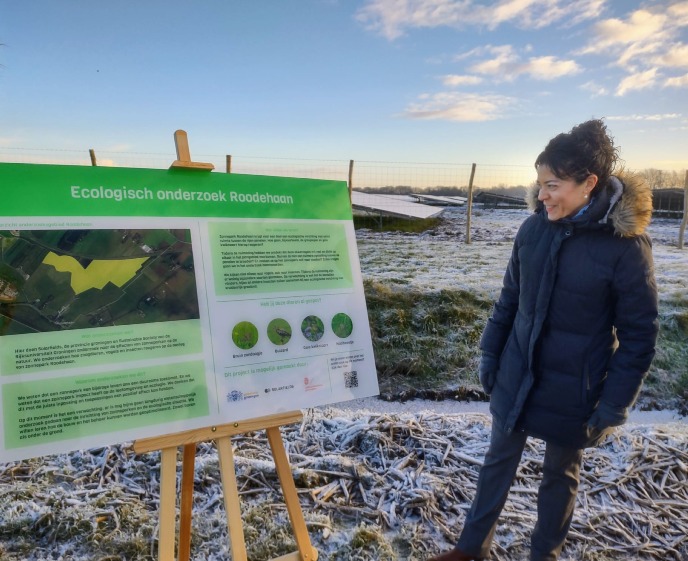Start major five-year research into the ecological effects of solar parks

Thursday 15 December marked the official start of a long-term scientific study of the ecological effects of solar parks. The study, initiated by the Groningen Provincial Executive and Solarfields, provides insight into what solar parks do for soil quality and biodiversity. Could solar parks provide opportunities for birds by strengthening the habit of farmland birds, for example, or do they constitute a threat? Biologist Sylvia de Vries – University of Groningen – will chart the soil, vegetation, insects, mammals and birds for 15 solar parks. The first results are expected next year.
Melissa van Hoorn, member of the Provincial Executive of Groningen:
'We would like to know how solar parks can be set up in the most responsible way. So that they produce benefits for nature alongside sustainable yields. This is the first scientific research that is looking to answer this. I’m so pleased that this study has started. This is a very specific way of working on a green future.'
Start ecological study
Sylvia de Vries, biologist at the University of Groningen: 'Solar parks are often constructed in an agricultural landscape that is used intensively. That means the use of pesticides and fertilisers disappears, which can have a positive impact on the soil. However, an area of habitat for farmland birds also disappears. What kind of impact does that have? How do you make sure that there is room for nature alongside room for solar parks? What would be better for biodiversity: grazing or no grazing? To what extent do farmland birds use solar parks as a breeding habitat or a foraging area? What is the added value for biodiversity of a more spaced-out arrangement of the panels? I hope to answer these and many more questions with my thesis.'
Fifteen solar parks
The study involves 15 solar parks of different owners in the province of Groningen. The researchers will chart the biodiversity and the soil quality for all 15 parks. In nine solar parks, they will also monitor the ecological values before, during and after the construction. In these parks there will also be a number of experiments in terms of arrangements and management. For example, the distance between the panels, the management of the vegetation between the panels and how the boundary of the park is set up.
Combination of functions in solar park Roodehaan
Solar park Roodehaan is one of the 15 solar parks in the study and is currently under construction. Various measures are taken to encourage positive ecological effects. For example, solar panels will be built in a more standard arrangement and there is extra space between the rows of panels. The aim is to see if a specific arrangement has any impact on biodiversity.
Jelmer Pijlman, Director of Solarfields:
‘This solar park will provide enough green power for 8,680 households. We will improve the planet with sustainable energy. However, this may never be at the expense of that very same planet. That is why we are looking for ways to generate sustainable energy that are inclusive of nature, that take account of local flora and fauna, and contribute to biodiversity.’
Parties involved
This five-year study into the effects of the construction of solar panels was commissioned by the University of Groningen, and is facilitated by the Groningen Provincial Executive, Solarfields, and the Rudolf Agricola School for Sustainable Development.
The PhD supervisor of Sylvia de Vries is dr. ir. Raymond Klaassen, member of Sustainable Landscapes, a theme within the Rudolf Agricola School for Sustainable Development of the University of Groningen.
Affiliated solar-park owners
Hanergy, Eneco, Sunvest, Energiestreek, Vattenfall, Powerfield, Ecorus, GroenLeven, LC Energy, TPSolar, Solar Proactive.


| Last modified: | 09 June 2023 4.52 p.m. |
More news
-
24 March 2025
UG 28th in World's Most International Universities 2025 rankings
The University of Groningen has been ranked 28th in the World's Most International Universities 2025 by Times Higher Education. With this, the UG leaves behind institutions such as MIT and Harvard. The 28th place marks an increase of five places: in...
-
05 March 2025
Women in Science
The UG celebrates International Women’s Day with a special photo series: Women in Science.
-
16 December 2024
Jouke de Vries: ‘The University will have to be flexible’
2024 was a festive year for the University of Groningen. In this podcast, Jouke de Vries, the chair of the Executive Board, looks back.

